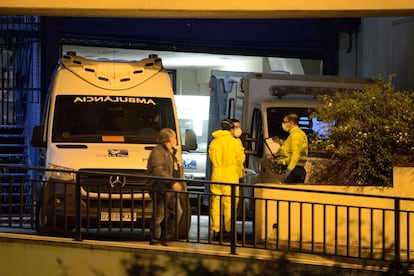“I lost my mother and my father in 15 days”
The Txagorritxu hospital is where half of the Covid-19 patients are being treated in the Basque Country. The area was the first site of an outbreak of the coronavirus in the region

“I lost my mother and my father in 15 days,” a 50-year-old woman manages to utter, as she sobs uncontrollably in the parking lot outside the emergency room at the Txagorritxu hospital, in Vitoria, northern Spain.
Her father, Vidal, she explains, died a few hours ago having contracted the SARS-CoV-2 coronavirus. He picked it up, she says, inside the hospital while he was with his wife, who died on March 3 from a heart problem.
Ambulances bringing patients to the emergency room sometimes pass the funeral cars taking away the bodies in the tunnel that leads to the building
It’s 9pm and the woman doesn’t want to move from the parking lot, because from there she can see the hearse that will take her father’s body away. She was unable to say goodbye to him. She waves farewell. “I’ve been left without parents in 15 days,” she says.
The Txagorritxu hospital is where half of the Covid-19 patients are being treated in the Basque Country region. The emergency room is one of the places where the coronavirus crisis is being played out in the Álava province. In it, 224 patients of the total 550 in the region are being treated. Among them, are 28 of the 53 patients who have required intensive care.
Ambulances bringing patients to the emergency room sometimes pass the funeral cars taking away the bodies in the tunnel that leads to the building. Faces wracked with pain and fear are seen in equal measure. This is where children are crying for their parents and grandchildren for their grandparents. “They can’t even go into the chapel to pray,” says a member of the security team. “They have told me that they’ve turned it into an area where they can put patients.”
To make room for the rising number of cases, the hospital has taken 200 beds to the building usually used for consults
At around 9pm on Thursday, three ambulances arrive all at once. The staff that attend to them, who are wearing full protective suits, are seeing the number of cases that they are taking into the hospital rise in double-digit percentages. Of the 470 beds in Txagorritxu, around 270 are occupied by coronavirus patients, with a worrying rise in people who require an artificial respirator, explain sources from the hospital. The rest of the beds are occupied with patients who have cancer or heart conditions.
To make room for the rising number of cases, the hospital has taken 200 beds to the building usually used for consults, and is working as a network with other nearby centers, allowing for the transfer of patients with other issues to private hospitals such as the nearby Quirón, as well as public centers such as the Eibar hospital.
But this doesn’t seem to be enough, and beds are being installed wherever possible, including the floor usually dedicated to clinical trials. “It’s a desperate situation,” explains a doctor on Thursday. “We have a colleague, a porter, who has been on a respirator for 11 days.” Her condition is not improving.
Infection tests in Txagorrixu are carried out twice a day, and the results take four hours to come back
Txagorritxu was the first site of an outbreak of the virus in Ávala. A chain of infections among health workers aggravated the situation, until many of them were forced to go into quarantine. The lack of health professionals is being alleviated thanks to the solidarity of and huge efforts being made by the personnel currently combatting the virus, albeit, they complain, with a certain lack of protective material and resources.
“The physical effort is huge, and in addition there is the emotional effort of seeing colleagues who go and hide so they can cry and then come back to work, as well as the fear, which we are dealing with as best we can,” say medical sources.
Infection tests in Txagorrixu are carried out twice a day, and the results take four hours to come back. Those who are diagnosed as having the coronavirus are taken alone into the hospital, into isolation. Once there, there are no friends or relatives to keep watch over them. The healthcare teams become their only family.
English version by Simon Hunter.
Tu suscripción se está usando en otro dispositivo
¿Quieres añadir otro usuario a tu suscripción?
Si continúas leyendo en este dispositivo, no se podrá leer en el otro.
FlechaTu suscripción se está usando en otro dispositivo y solo puedes acceder a EL PAÍS desde un dispositivo a la vez.
Si quieres compartir tu cuenta, cambia tu suscripción a la modalidad Premium, así podrás añadir otro usuario. Cada uno accederá con su propia cuenta de email, lo que os permitirá personalizar vuestra experiencia en EL PAÍS.
¿Tienes una suscripción de empresa? Accede aquí para contratar más cuentas.
En el caso de no saber quién está usando tu cuenta, te recomendamos cambiar tu contraseña aquí.
Si decides continuar compartiendo tu cuenta, este mensaje se mostrará en tu dispositivo y en el de la otra persona que está usando tu cuenta de forma indefinida, afectando a tu experiencia de lectura. Puedes consultar aquí los términos y condiciones de la suscripción digital.









































